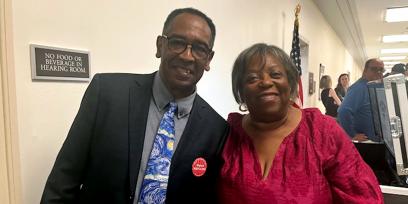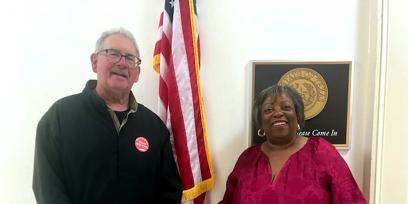The House Ways and Means Subcommittee on Social Security heard testimony April 17 from Social Security experts about how the Windfall Elimination Provision (WEP) and Government Pension Offset (GPO) unfairly impact people who have devoted much of their careers to public service—including educators, federal employees, police officers and firefighters. Several AFT retirees went to Washington, D.C., to listen in on the hearing—the first congressional hearing on the topic in decades—and to lobby their lawmakers, sharing their personal experiences with the WEP/GPO and its impact on their retirement income.
They emphasized the importance of understanding WEP/GPO and advocating for changes to the law to better support retirees, while acknowledging the challenges faced by retirees in the current political climate.
The WEP and GPO, enacted into law in 1983, primarily affect state and local government employees, such as teachers, police officers and firefighters, who receive a pension based on earnings that are exempt from Social Security payroll taxes. The WEP reduces the benefits of certain beneficiaries entitled to both Social Security benefits and pension benefits from employment not covered by Social Security. The GPO reduces benefits received by surviving spouses who also collect a government pension.
Rita Runnels, a retired educator from Texas learned about WEP/GPO when her husband died in 2019. When she inquired about his Social Security benefits, Runnels was told that because she received a Texas Retirement System pension, she could not receive Social Security due to the WEP/GPO.
“It was a big shock. After losing my husband and having to adjust to not having him with me,” she says, “I also had to adjust to not having his income with mine. It puts a huge dent into your household budget and your life.”
To fill the void, Runnels returned to work. She now works part time for her union, as an organizer for Cy-Fair AFT in Houston, and she is also the chair of Texas AFT Retiree Plus. “That's how I really got involved in the advocacy work. I started going to the state Capitol and writing letters and postcards, and door knocking to get out the vote. I just poured myself into what I can do to make it better for, you know, the retirees to come so they won't have to deal with it.”
Roger Boudreau, a retired educator from Rhode Island filed for Social Security benefits when he turned 65. “I had been receiving, of course, as most people did, at that point, my annual statements from [the Social Security Administration], indicating what I could expect to receive as a monthly benefit,” he says. “And when I went to apply for Social Security, I was informed that the death benefit would be cut by 40 percent.
“It was not easy adjusting,” says Boudreau, who is president of the Rhode Island AFT Retirees. “Our public pensions were frozen in 2012. When I reached full retirement age, I anticipated not only having my full Social Security benefits, but was also expecting to have a 3 percent COLA every year, which I no longer had. So, it was a double whammy.”
With lawmakers deeply divided in partisan trenches, when it comes to broader Social Security reform, moving forward on issues like WEP/GPO can seem like an uphill battle, even with bipartisan support.
“I was disappointed to a degree,” Runnels says regarding the hearing, noting that it seems as if lawmakers were sticking to the stance of their own party. “This is a bipartisan issue, so it shouldn't have to do with what party you are a member of, it should have to do with how people are treated and the lives of people.”
“It was pretty much what we expected to hear, given the fact that three of the four panelists were selected by Republicans,” says Boudreau. “Those panelists were clearly not supportive of a full repeal; each of them talked about reforms of one form or another. Our position is that we have earned benefits.”
Before attending the hearing, the retirees took their message directly to their Republican representatives in hopes of persuading them to support bipartisan legislation, the Social Security Fairness Act (H.R. 82), which would eliminate both the WEP and the GPO from the Social Security Act.
“It's always a great opportunity to be able to deal directly with a member of Congress,” says Boudreau. “But I think our experience was indicative of the difficulty that we have in dealing with that side as it relates to retirees and retiree issues, or any issues that are related, for that matter.”
“We have a mountain to climb, because of the rhetoric and what's going on now, but we need to continue to make sure our voices are heard, and then we need to work hard to get teachers out to vote,” says Runnels. “Our work is cut out. But I'm so thankful that we had that option to go. We have a little bit more work to do, but I don't think it's something that cannot be accomplished.”
[Adrienne Coles]


